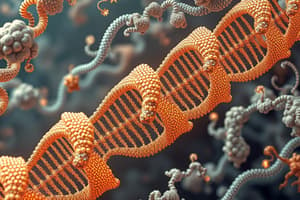Podcast
Questions and Answers
What stage of protein synthesis does NOT require energy?
What stage of protein synthesis does NOT require energy?
- Initiation
- Termination
- All stages of protein synthesis require energy (correct)
- Elongation
The formation of a-D-glucopyranose from B-D-glucopyranose is called?
The formation of a-D-glucopyranose from B-D-glucopyranose is called?
Glycosidation
Becoming a college student requires hard work and diligence in academics. As such, being a college student graduate would be considered a(n):
Becoming a college student requires hard work and diligence in academics. As such, being a college student graduate would be considered a(n):
- Master status
- Ascribed status
- Pigeonholed status
- Achieved status (correct)
A stroke patient comprehends speech but cannot move her mouth to form words. Which of the following brain areas is most likely affected?
A stroke patient comprehends speech but cannot move her mouth to form words. Which of the following brain areas is most likely affected?
Each individual in a group of teenagers is asked to estimate the height of a tree. One individual estimates the height to be 25 feet, but after discussing with the group is convinced that the height is likely closer to 40 feet. Which type of conformity is seen here?
Each individual in a group of teenagers is asked to estimate the height of a tree. One individual estimates the height to be 25 feet, but after discussing with the group is convinced that the height is likely closer to 40 feet. Which type of conformity is seen here?
Which of the following neurotransmitters is associated with both schizophrenia and Parkinson's disease?
Which of the following neurotransmitters is associated with both schizophrenia and Parkinson's disease?
Why are triglycerides used in the human body for energy storage?
Why are triglycerides used in the human body for energy storage?
Flashcards are hidden until you start studying
Study Notes
Protein Synthesis
- Energy is required for initiation, elongation, and termination stages of protein synthesis.
- No stage of protein synthesis occurs without energy input.
Carbohydrate Chemistry
- The conversion of β-D-glucopyranose to α-D-glucopyranose is known as glycosidation.
- This reaction involves the alteration of the anomeric carbon in carbohydrate chemistry.
College Status
- Achieved status refers to a status acquired through personal efforts and hard work, such as graduating from college.
- Other statuses include ascribed (inherited characteristics) and master status (dominant social status).
Language and Brain Function
- Damage to Broca's area results in the ability to understand speech but impairment in forming words.
- Broca's area is crucial for the motor function associated with language production.
Conformity in Groups
- Internalization occurs when an individual alters their opinion to align with a group and also personally agrees with the group's views.
- This process demonstrates the influence of group dynamics on individual thought.
Neurotransmitters and Disorders
- Dopamine is linked to both schizophrenia and Parkinson's disease.
- It plays a significant role in various neurological functions and disorders.
Energy Storage in the Body
- Triglycerides serve as an efficient energy storage form due to their highly reduced fatty acid chains.
- Upon oxidation, these chains release significant amounts of energy, making triglycerides more efficient than polysaccharides.
Studying That Suits You
Use AI to generate personalized quizzes and flashcards to suit your learning preferences.




